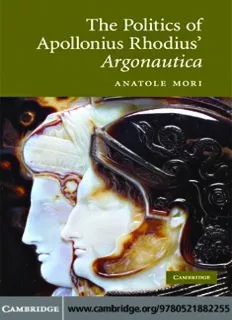Table Of ContentThis page intentionally left blank
THE POLITICS OF
APOLLONIUS RHODIUS’
ARGONAUTICA
ApolloniusRhodius’epicpoem,theArgonautica,isoneofthemost
important and influential literary productions of the Hellenistic
period.Thisbookshowshowtheretellingofaheroicadventureset
in the generation before the Trojan War engages the political, reli-
gious, and ethical dynamics of its day by alluding to the real-world
contextoftheearlyPtolemaicdynastyaswellastopoeticandother
models.Throughahegemonictypologythatrangesfromthejustand
theocratictotheduplicitousandlawless,Apolloniuscharacterizesthe
political heirs of Alexander the Great as pious, civilized rulers. This
interpretationgoesbeyondpreviousstudiesbyexaminingthepolitical
resonanceofreligiousactivityinthepoem,andbyrelatingthesefor-
mulations(especiallywheretheyconcernApollonius’departuresfrom
his literary predecessors) to the ideological construction of Hellenic
identityinthird-centuryEgypt.
anatole mori isAssociateProfessorofClassicsattheUniversity
ofMissouri-Columbia.
BronzecultstatuetteofAlexanderAigiochos(“Aegis-Bearing”)withchlamys-shaped
aegis.RomancopyfromAlexandria(London,BritishMuseum).Originaldatedto
latefourthcenturyBC.PhotocourtesyoftheBritishMuseum,(cid:2)c TheTrustees
oftheBritishMuseum
THE POLITICS OF
APOLLONIUS RHODIUS’
ARGONAUTICA
ANATOLE MORI
CAMBRIDGE UNIVERSITY PRESS
Cambridge, New York, Melbourne, Madrid, Cape Town, Singapore, São Paulo
Cambridge University Press
The Edinburgh Building, Cambridge CB2 8RU, UK
Published in the United States of America by Cambridge University Press, New York
www.cambridge.org
Information on this title: www.cambridge.org/9780521882255
© Anatole Mori 2008
This publication is in copyright. Subject to statutory exception and to the
provision of relevant collective licensing agreements, no reproduction of any part
may take place without the written permission of Cambridge University Press.
First published in print format 2008
ISBN-13 978-0-511-43722-9 eBook (EBL)
ISBN-13 978-0-521-88225-5 hardback
Cambridge University Press has no responsibility for the persistence or accuracy
of urls for external or third-party internet websites referred to in this publication,
and does not guarantee that any content on such websites is, or will remain,
accurate or appropriate.
Contents
Listoftables page vi
Acknowledgments vii
Listofabbreviations viii
1 Introduction 1
2 ThepoliticsofAlexandrianpoetry 19
3 StrifeandrestraintamongtheArgonauts 52
4 SexualpoliticsinLemnos,Colchis,andDrepane 91
5 Piety,mediation,andthefavorofthegods 140
6 ThebonesofApsyrtus 187
7 Quiddeniquerestat:ApolloniusandVirgil 224
Bibliography 236
Index 256
v
Tables
4.1 TheearlyPtolemies. page97
5.1 SacrificesintheArgonautica. 157
5.2 ImpliedsacrificesintheArgonautica. 160
vi
Acknowledgments
It is difficult for me to imagine how I could have completed this project
without the help of Richard Hunter, who saw it in its initial stages as a
UniversityofChicagodissertationandwhosewisecounselinrecentyears
has been of greater value to me than I can say. I have benefited from
perceptivecriticismofferedbyAlexSens(whohasreadthroughmorethan
one incarnation of the manuscript), James Clauss, Graham Shipley, and
Susan Stephens, all of whom have saved me from an embarrassment of
errors. Earlier versions of several sections from Chapter 3 first appeared
in the American Journal of Philology 126.2 (cid:2)c 2005 by The Johns Hopkins
University Press and are here reprinted with their kind permission. I am
gratefultotheLoebClassicalLibraryFoundationfortheirgeneroussupport
in2004–2005,andtotheDepartmentofClassicalStudiesattheUniversity
ofMissouri-Columbiaforarrangingaleavefromteachinginthewinterof
2004.
For their encouragement and learned advice, I am greatly indebted to
mycolleaguesJohnMilesFoley,RichardFoley,RaymondMarks,Charles
Saylor,DennisTrout,andBarbaraWallach.Fortheirthoughtfulresponses
toseveralchaptersIthankDavidSchenker,JamesMcGlew,andespecially
Daniel Hooley, whose judicious suggestions substantially improved the
wholemanuscript.IoweadebtofthankstoIanWorthingtonforimportant
corrections to an early draft and for his guidance in general, to Stefani
Engelstein for comparing notes as our respective labors evolved, and to
Nicole Monnier for helping me keep things in perspective. Most of all, I
want to thank my colleague (and husband), Michael Barnes, with whom
I share a dangerous passion for the poetry of Apollonius, and it is to him
thatIdedicatethisbook.
vii
Abbreviations
Spelling and abbreviation generally adhere to the onomastic conventions
of the Oxford Classical Dictionary. Modern periodicals and multivolume
reference works are abbreviated as in L’Ann´ee Philologique. Apollonius is
cited from Vian 2002; Virgil from Mynors 1969. All translations are my
ownexceptwhereindicatedotherwise.
AB C.AustinandG.Bastianini(eds.)PosidippiPellaeiquae
supersuntomnia.Milan,2002.
ABV J.D.Beazley.AtticBlack-FigureVase-Painters.Oxford,1956.
CAH F.W.Walbank,A.E.Astin,andM.W.Frederiksen(eds.)The
CambridgeAncientHistory.Vol.7.1:TheHellenisticWorld.
2ndedn.Cambridge,1984.
CG Catalogueg´en´eraledesantiquit´es´egyptiennesduMus´eeduCaire
(withmonumentnumber).
Etym.M. T.Gaisford(ed.)Etymologiconmagnum.Amsterdam,1962.
FGrH F.Jacoby(ed.)DieFragmentedergriechischenHistoriker.
BerlinandLeiden,1923–40;1940–59;1994–.
GP A.S.F.GowandD.L.Page(eds.)TheGreekAnthology:
HellenisticEpigrams.2vols.Cambridge,1965.
IGII InscriptionesGraecaeII/III,Part1:InscriptionesAtticae
Euclidisannoposteriores,fasc.i:decretaannorum403/2–
230/29.2ndedn.Ed.J.Kirchner.Berlin,1913.
IGVII InscriptionesGraecaeVII:InscriptionesMegaridisetBoeotiae.
Ed.W.Dittenberger.Berlin,1982.
IGXI InscriptionesGraecaeXI,fasc.iv:InscriptionesDeli.Ed.P.
Roussel.Berlin,1914.
IGXII InscriptionesGraecaeXII:InscriptionesmarisAegeaipraeter
Delum,fasc.iii,supplement.Ed.F.H.deGaetringen.Berlin,
1904;fasc.vii.Ed.F.H.deGaetringen.Berlin,1908.
viii

